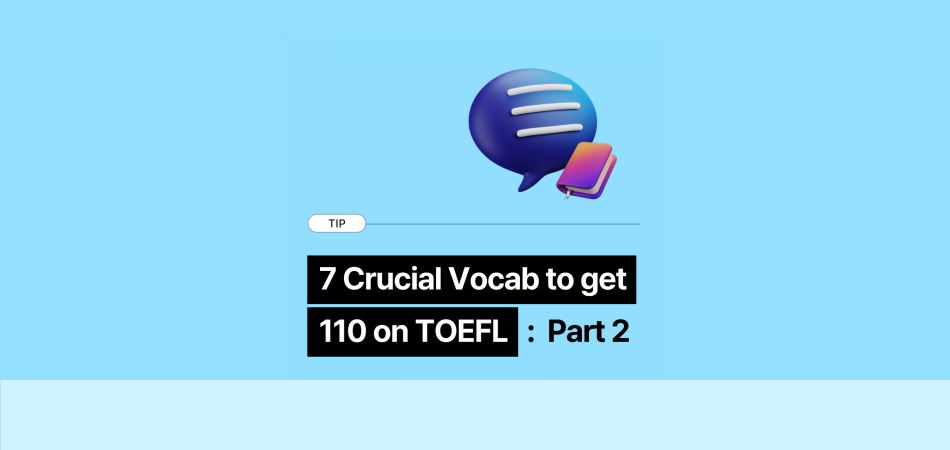If your goal is to achieve a TOEFL score of 110, are there specific words that you absolutely need to memorize?
As mentioned before, the TOEFL includes synonym and antonym questions, and the importance of paraphrasing cannot be overstated. High scores often hinge on subtle nuances, and today’s selected words and their synonyms are crucial for effective last-minute cramming. I believe memorizing these words and their synonyms will undoubtedly assist you in a crunch. Detailed memorization tips for each word are provided, so try to memorize them as you read.
⓵ mundane

The first word is ‘mundane.’ The adjective ‘mundane’ is used to express a belonging to the world, encompassing the worldly and secular meanings.
-
Synonyms : commonplace, banal, everyday
Starting with a worldly and secular meaning like ‘worldly,’ it extends to convey a sense of being ordinary and lacking individuality. It is also used to describe things as boring and commonplace. Memorizing that it can be employed to depict mundane and ordinary activities like paying bills, doing household chores, or going to the grocery store will be beneficial.
Let’s practice with the following example sentences.
The details are different and often quite mundane.
⓶ inscrutable

The term we are memorizing today, “inscrutable” is formed by adding the negative “not” to “in” in the word “scrutable” which originally means ‘easy to understand.’
As a result, “inscrutable” conveys the opposite meaning, indicating something ‘perplexing’ or ‘difficult to comprehend.’
-
Synonyms : unfathomable, enigmatic, inexplicable
Not even the experts could understand the killer’s inscrutable motives.
⓷ platitude

There is a term called “platitude” used when making clichéd expressions or sharing thoughts that are overly common or lack depth. The word originates from the French word ‘plat,’ meaning flat, and is combined with the suffix ‘-itude,’ creating a term that refers to flat or dull remarks.
-
Synonyms : buzzwords, cliche, verbiage
The adults stunned into silence, no prayer or platitude capable of filling the void.
⓸ construe

“Construe” specifically refers to interpreting or understanding the meaning of language in a particular way. Unlike “interpret,” which emphasizes explaining or understanding the meaning of something, construe places more emphasis on the analysis and decomposition of text or speech to comprehend its meaning.
However, it’s important to note that “construe” can carry a slightly negative connotation, implying a more literal or narrow interpretation. On the other hand, “interpret” is more neutral and can suggest a broader range of meanings.
-
Synonyms : interpret, infer, decipher
I’m not sure how to construe her behavior.
⓹ feasible

Is my idea feasible?
The term “feasible” is often employed when describing practical and implementable solutions or plans that are executable, possible, plausible, realistic, and appropriate.
-
Synonyms : attainable, viable, worthwhile
The company decided to invest in the project because it was economically feasible.
While it might seem similar to “possible,” which implies two possibilities – something can happen or not happen, “feasible” is used to suggest a higher likelihood of occurrence. It is particularly prevalent in technical or professional contexts. As seen in the example above, it adds a more professional tone to the content.
⓺ didactic

Derived from the Greek “didaktikos,” meaning apt at teaching, the term “didactic” is now commonly used to convey an instructive or educational meaning. However, it is worth noting that it can also be employed with a negative connotation, suggesting an excessive or tedious amount of instruction, even to the point of being boring.
-
Synonyms : pedantic, sermonic, preachy
The book is a didactic novel that teaches readers about the dangers of greed.
⓻ deplete

In today’s TOEFL exam, the final word is “deplete.” It is used to signify excessive usage and depletion.
-
Synonyms : exhaust, absorb, drain
In the long term, quality of living for the poorer class will deplete.
Similar terms include:
While it may seem similar to “diminish,” deplete is employed when describing the reduction of finite resources, whereas “diminish” is used in a broader context to indicate a decrease in importance, value, or impact.
Review Quiz

Receive a complimentary set of TOEFL practice tests upon registration!

Currently, at our TestGlider platform, we are offering a free TOEFL practice test set to new registrants. This promotion is available for a limited time. Many participants have shared positive feedback, noting that the scores closely resemble real test results. We hope that this gift, designed to provide an experience similar to the actual exam, will be valuable for your preparation. For more detailed information on this promotion, please click on the link below or check the yellow card news above.
Get your practice test now by clicking here.
For those interested in more word content, please refer to the information below.
